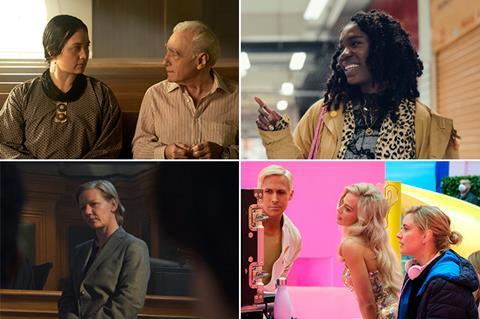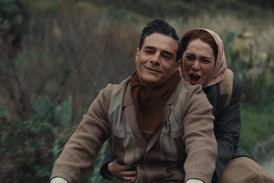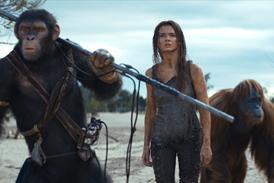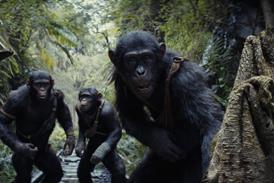Screen International analyses the 2024 Bafta Film Awards nominations, which were unveiled today (Jan 18) in London, and saw Oppenheimer lead the way with 13 nods.

Juries pull in different directions
The impact of juries across multiple categories can be seen clearly this year. Juries already existed for a couple of categories prior to the #BaftaSoWhite controversy of the 2020 nominations list, but were then significantly expanded in number and scope, and we are now into the fourth year of this evolving set of Bafta interventions. There are separate juries for the four performance categories – and this year there are nominations for All Of Us Strangers’ Paul Mescal and Claire Foy in supporting actor and actress, but no Andrew Scott in leading actor. Scott was on the Bafta longlist of 10, and the leading actor jury could have nominated him, but didn’t.
In each acting category, three performers are nominated by virtue of being the top choices of the performance chapter in first-round voting, then juries add three more to deliver six nominees per category.
For Past Lives, Teo Yoo is nominated for leading actor, but Greta Lee, who is the heart of the film, is omitted in leading actress – despite being on the longlist of 10 for her category. Had a single jury been responsible for adding the names across both lead acting categories, this outcome could have been different.
Other longlisted actors not nominated by the respective juries include Killers Of The Flower Moon’s Lily Gladstone and Leonardo DiCaprio (despite the film’s Robert De Niro achieving a nomination for supporting actor), American Fiction’s Jeffrey Wright and Poor Things’ Mark Ruffalo. All may have better luck with US Academy voters – Oscar nominations are announced next Tuesday (January 23). Gladstone’s omission is especially notable given her frontrunner status across awards season, most recently winning a Golden Globe; Oscar voters are highly unlikely to omit her for a role that touches a very American nerve.
Different juries reached rather opposite conclusions in the two British categories. In outstanding British film, admired debuts Rye Lane, Scrapper and How To Have Sex were all nominated. But in outstanding British debut (which has its own separate jury), two of those films are missing: Rye Lane and Scrapper. Instead, the five nominees are dramas How To Have Sex and Earth Mama plus documentaries Blue Bag Life, Bobi Wine: The People’s President and Is There Anybody Out There?. Outstanding British debut is a fully juried process. The jury voted Rye Lane and Scrapper onto its longlist of 10, but evidently decided not to progress those films further.
In the case of outstanding British film, five of the 10 films are nominated by virtue of being the top choices of the British opt-in chapter in first-round voting, and a jury adds five more. Looking at the nominated titles, including potential voter favourites Napoleon, Wonka, Poor Things and Saltburn, it seems likely that the debut films among the 10 nominees were all added by the British film jury.
Missing women directors found in original screenplay
It is a strong year for contenders but nevertheless, it is disappointing not to see Greta Gerwig’s Barbie and Celine Song’s Past Lives recognised for either best film or best director, surely further evidence for Bafta to expand the best film category for 2025. Never fear, Gerwig and Song can be found in the original screenplay category. Gerwig has received two previous Bafta nominations, for her screenplays for Lady Bird and Little Women, despite also directing both of those films. Anatomy Of A Fall’s Justine Triet is the only woman nominated in the best director category; it is also the only film directed by a woman in the best film category.
This is the same number as last year, when Gina Prince-Bythewood was nominated for The Woman King and no film by a woman was nominated in best film. In 2022, three female directors were nominated but only one for best film and in the pandemic-hit year of 2021, a record four female directors were nominated in the best director category, while two were nominated for best film.
In 2020, pre-jury interventions, there were none.
This year, there are no women to be found in several key categories including adapted screenplay, cinematography, original score and sound.
Not (quite) a Barbie world at the Baftas
A phenomenon at the box office, Barbie’s Bafta performance can best be described as middling. While it garnered a respectable five nominations, including best actress for Margot Robbie, this is significantly down from the 15 longlist slots it achieved earlier this month. Jonathan Glazer’s The Zone Of Interest is also a surprise omission from the best film category, despite earning nine nominations overall; ever since its Cannes debut, the powerful Holocaust drama has been regarded as a strong best film contender. Killers Of The Flower Moon did make the best film line-up despite Martin Scorsese being absent from the best director list. Scorsese’s film is not represented in the screenplay or lead actor categories either, although it did achieve an impressive nine nominations overall, registering strongly in craft categories. Also missing from the director category is Yorgos Lanthimos, even though Poor Things received 11 nominations in total, including best film.
There’s only one nomination for holiday box-office hit Wonka, in the outstanding British film category, despite it racking up eight longlist spots. Awards season favourite American Fiction also ended up with a single nomination, in adapted screenplay. Todd Haynes’ May December was blanked entirely.
Missing part 2: producers and directors of colour
The nominations reflect the work-in-progress status of Bafta’s diversity efforts. All six best director nominees are white (four of seven last year), as are all 14 producers of the five best film nominees (13 of 15 last year). There is one person of colour in each of the two screenplay categories (Celine Song for Past Lives in original; Cord Jefferson for American Fiction in adapted).
Outstanding British Film is equally dominated by white faces, aside from Rye Lane’s Raine Allen-Miller, plus producer Yvonne Isimeme Ibazebo and writer Nathan Bryon; and How To Have Sex producer Emily Leo.
There is slightly more diversity in the acting categories. However, the six people of colour across the four sections is down on nine from last year, seven from 2022, and 16 from 2021. The Color Purple duo of Fantasia Barrino and Danielle Brooks are in leading and supporting actress respectively, with Rye Lane’s Vivian Oparah also in leading actress. Rustin’s Colman Domingo is nominated for leading actor alongside Past Lives’ Teo Yoo; with Da’Vine Joy Randolph selected in supporting actress, where she is a frontrunner for her role in The Holdovers.
2024 is a competitive year – there are not enough spots to accommodate every worthy film and actor. However, it is unfortunate that the key performers to have missed out – such as Killers Of The Flower Moon’s Gladstone and American Fiction’s Jeffrey Wright – would have improved Bafta’s diversity standing for the 2024 awards.
Anatomy Of A Fall catches a break
Triet’s Palme d’Or winner now has the potential (on paper) to clean up in the major categories. It has been nominated in all seven of the categories in which it was longlisted. As previously mentioned, Triet is the only female filmmaker to be nominated in both the director and best film categories. Anatomy is also present in film not in the English language, original screenplay, leading actress (Sandra Hüller), casting and editing.
This comes in spite of the mystery drama being overlooked as France’s nomination for the international feature, in favour of Tran Anh Hung’s The Taste Of Things.
The (mostly) French-language feature already has plenty of awards momentum behind it, being the major winner at the European Film Awards, taking home five prizes, on top of nods from the Golden Globes, Bifas, Gothams and Critics’ Choice awards. It is also performing well at the UK-Ireland box office for distributor Lionsgate, at £1.65m.
In terms of nominations, it doesn’t match up to last year’s All Quiet On The Western Front, Netflix’s German-language First World War drama which tied with Ang Lee’s Crouching Tiger, Hidden Dragon as the most-nominated non-English language feature in Bafta history, with 14 mentions. But All Quiet…’s triumph at last year’s ceremony (taking home seven prizes, more than any other film) could be an encouraging indicator as to the growing appreciation of non-English language fare at the Baftas.
Strong showing for Screen’s Stars of Tomorrow
For 20 years, Screen’s Stars of Tomorrow portfolios have provided a platform to rising talents and this year’s nominations include people from across those two decades: Oppenheimer supporting actress Emily Blunt, a Star in the inaugural 2004 edition, alongside Nathan Bryon and Tom Melia, 2023 Stars and nominated for outstanding British film as writers of Rye Lane.
Filmmakers are well represented, including How To Have Sex director Molly Manning Walker (2021) in outstanding British debut and outstanding British film; with recognition also for Rye Lane’s Raine Allen-Miller (2021), Scrapper’s Charlotte Regan (2020) and Is There Anybody Out There?’s Ella Glendining (2020). The hope is they can continue making films and become industry stalwarts – as has done 2008 Star Andrew Haigh, nominated in director, adapted screenplay and outstanding British film for All Of Us Strangers.
Nominated A-list actors from Stars years gone by involved in nominated films include Carey Mulligan and Claire Foy (both 2008), Barry Keoghan (2015) and Paul Mescal (2020). Stars of Tomorrow also celebrates heads of department, including casting director Isabella Odoffin, a 2019 Star and nominated for How To Have Sex.

























No comments yet